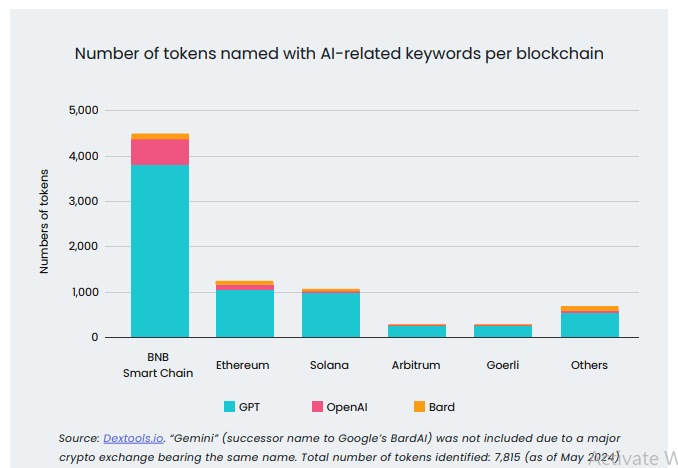
A new study has found that crimes enabled by artificial intelligence in the cryptocurrency ecosystem are still in their nascent stages. Stakeholders can prevent these activities from becoming widespread through timely and measured responses. Data from the same study indicate a surge in tokens featuring AI-related keywords such as GPT, Openai and Bard. Approximately 4,500 of these tokens are present on the BNB Smart Chain.
Early, Measured Responses Crucial to Preventing AI-Enabled Crime Going Mainstream
A recent study on artificial intelligence (AI)-enabled crime within the cryptocurrency asset ecosystem reveals that most identified AI-related threats are nascent. The study report suggests stakeholders can mitigate these threats with measured early responses before they gain prevalence.
The study which was conducted by Elliptic outlines five typologies of AI-enabled crime that key stakeholders must address to prevent escalation. It also highlights the growing use of generative AI in cryptocurrency scams as a crime type that crypto professionals and law enforcement can collaboratively tackle.
The study report underscores the enhanced capabilities of malicious actors through recent incidents involving AI-generated deepfakes of notable figures such as Elon Musk. In one particularly brazen use of a deepfake, cybercriminals produced a video featuring former Singapore Prime Minister Lee Hsien Loong endorsing a cryptocurrency scam. Additionally, deepfakes mimicking former Taiwanese Presidents Tsai Ing-wen and Lai Ching-te have been utilized.

Furthermore, the Elliptic report indicates a rise in criminals leveraging technology to create so-called AI tokens. The data reveals a spike in tokens featuring AI-related keywords, with many (approximately 4,500) present on the BNB Smart Chain. The data also indicates that most AI-related tokens use the term GPT more than Open AI or Bard.
State-Sponsored Hackers Attempt to Integrate AI
The report noted that AI models, such as Chatgpt, which are capable of detecting vulnerabilities in smart contracts, are now being exploited by hostile state actors to conduct cryptocurrency heists. The report singles out North Korea-backed hackers as some of those attempting to use AI to enhance their capabilities in conducting large-scale heists.
“Hostile state actors based in North Korea have been attributed to over 60 cryptocurrency heists by the United Nations, stealing over $3 billion in crypto between 2017 and 2023. Recent reports and future threat assessments suggest that North Korean groups are turning to AI to enhance their hacking capabilities,” the Elliptic report said.
The report meanwhile warned that the success of containing these threats hinges on the degree of collaboration among various stakeholders. Identified stakeholders include law enforcement investigators, crypto compliance professionals, AI and crypto users, technology developers, as well as policymakers and regulators.
Furthermore, the report recommends prevention measures collectively referred to as DECODE, an acronym for Detect, Educate, Cooperate, Defend, and Enforce. By adopting these measures and other recommendations, stakeholders can help ensure the benefits of AI and crypto assets will continue to exceed their potential criminal exploitation.
Source: Bitcoin



